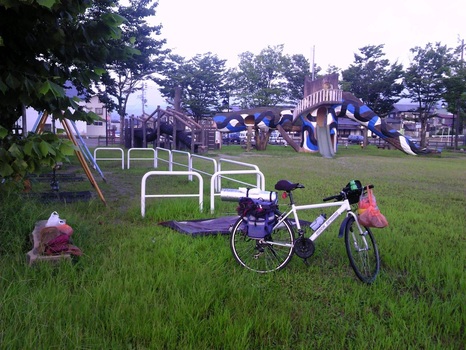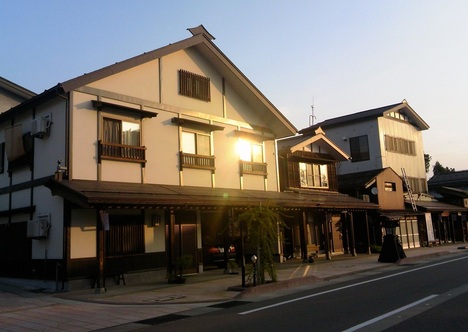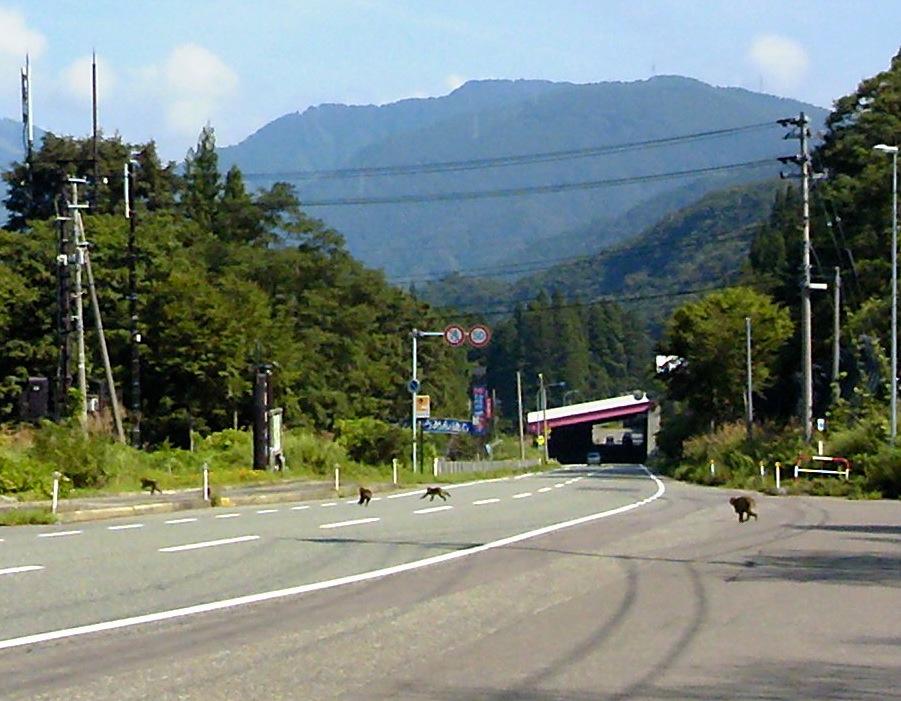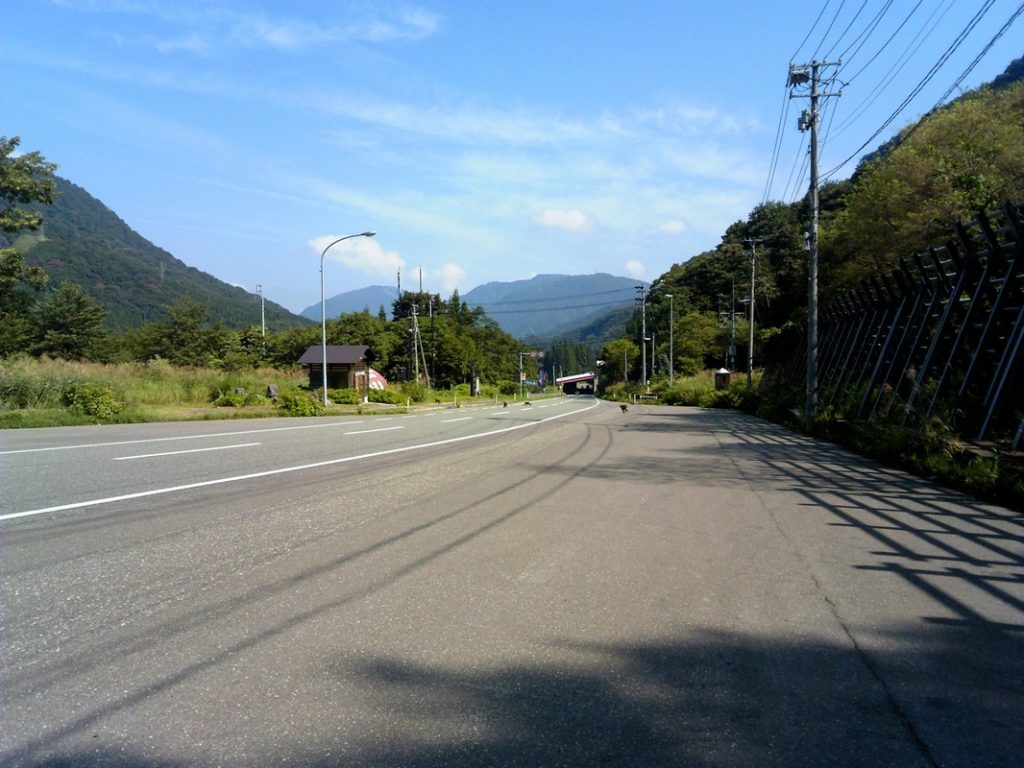
This photo was taken at 5.30am, because, quite frankly, I was a bit anxious about the whole nojuku thing and hadn’t slept very well. For that added touch of surrealism, I had managed to pitch the Snow Peak directly behind Bokushi-dohri, a shopping street constructed in the Edo style as a kind of living museum, so there was some nice architecture to look at as I cycled off into the sunrise.

Stopping for my usual convenience store breakfast, I met a tall, smartly dressed man in a baseball cap, polo-neck sweater and chinos.
‘My son lives near here,’ he told me, ‘so I come and stay at least a couple of times a year. In the winter I go ski-ing and in the summer I play golf. I’m playing eighteen holes with a friend of mine this morning – he’s supposed to be picking me up in a minute.’
‘You’re probably pretty good, I should imagine.’
‘Not bad, although I’m eighty now, so I can only hit the ball about a hundred yards. When you get to my age you don’t have the flexibility in your shoulders to get a good swing.’
‘What’s your best score, then?’
‘About seventy-eight, I think, although that was probably twenty or thirty years ago. Nowadays it’s more like a hundred.’
Bokushi-dohri is part of the Mikuni-kaidoh (三国街道 / ‘Three countries highway’), which has served as a route between Tokyo and Niigata for several centuries, and which I would be following today on my way into Gunma Prefecture. At Echigo-yuzawa the Joh-etsu expressway heads into an eleven-kilometre-long tunnel – the longest road tunnel in Japan – while the Mikuni-kaidoh (aka Route 17) goes from flat to steep in a matter of moments, and stays that way for the next thirty or so kilometres.
After the first few hairpin bends I stopped in front of an isolated two-storey house, where a young man in a blue puffer jacket was starting up his scooter in the front yard. He introduced himself as Fueda-san and asked where I was from.
‘England,’ I said.
‘And what do you do?’
‘I work as an ALT.’
‘That’s what I was doing until April, except I was teaching Japanese at a school in China. I need to find a job so I can save some more money and go back.’
‘Are you off to a job interview now?’
‘No. It’s Hello Work, I’m afraid.’
Hello Work is the Japanese equivalent of a job centre, and from what I can tell, going to one can be a similarly dispiriting experience.
‘Do you want to move to China for good?’ I asked.
‘I want to live in Taiwan eventually. That’s where my girlfriend’s from – we speak to each other on Skype every couple of days, so I’m trying to improve my Chinese.’
Noticing that my water bottle was empty, Fueda-san told me to re-fill it at a tap next to the garage.
‘That’s fresh spring water straight from the ground, so it should be ice cold,’ he said, and we wished each other luck before he sped off down the hill.
Route 17 was lined with ski-slopes and high-rise hotels, which because this was off-season were practically empty, so for most of the morning I had the road to myself. When I stopped in a layby for another drink (it wasn’t until I had downed a bottle-full that I noticed a sign above the washroom sink that read Nomémasen! / Undrinkable!), it was quiet enough that a family of monkeys emerged from the forest to scamper across the road.

Although in case you’re under the impression this was a David Attenborough-style close encounter, here is the original, un-cropped photo:

I reached the Mikuni Pass at about midday, where the view was one of the lushest and most tree-filled I had ever seen (with so much natural forestation, I should imagine this is a good place to see the autumn colours).

Combined with an early start, the climb had completely wiped me out, and with the Konsei Pass on my itinerary for the following day, I decided that another night of nojuku was out of the question. The only thing for it was to break out my Emergency Cash Card, find a cheap hotel and get a decent night’s sleep. Mrs M wouldn’t be too happy when she found out that the trip had gone over-budget, but in the interests of a) my health and b) starting work again on 1st September, I withdrew another 10,000 yen from a post office ATM and braced myself for a stern talking to when Mrs M next checked our bank balance.
The first hotel I tried in Numata City was fully booked, but as well as having vacancies, the second – the Sasaya – was a fair bit cheaper and a lot more characterful. The woman behind reception was dividing her time between watching TV and babysitting her grandson, and when I asked where I could leave the Rock Spring, she told me to bring it through the main doors and park it among a collection of bikes and prams next to the drinks machine (neglecting to take your shoes off as you enter a building is considered to be bad manners in Japan, so wheeling a bicycle across a pile carpet felt positively criminal).
After checking in I went straight to the communal baths, where the sauna was mysteriously chilly.
‘This isn’t working, is it?’ I said to a fellow bather.
‘It’s working all right,’ he said. ‘They just set it to a low temperature, that’s all. It’s always like that.’
Most onsen will have a cold bath in which to cool off after your sauna, but that was empty too, so I assumed the owners were either keen practitioners of setsuden, or didn’t have enough guests to justify the expense of firing up the sauna.
Despite advertising itself as a wedding venue, the Sasaya was distinctly rough around the edges: the toilet roll holder in my bathroom, for example, was stuck to the wall with gaffer tape, there was a large cigarette burn on the shelf above the sink, and a hand-written notice on the ancient, free-standing air conditioner warned that it would leak if I tried to move it. Not that I needed an air conditioner, as the room itself was almost completely sealed off from the outside world. It was how I imagine being on a space station must feel, as I had no sense of the outside world whatsoever: there were no windows, it was eerily quiet, and even on a summer’s day the temperature remained at a constant 20 degrees.
When I arrived back from buying dinner at the local supermarket, an old man with fly-away white hair was sitting at the reception desk and peering at a newspaper through a magnifying glass. The Sasaya is about as close as you’ll get in Japan to Fawlty Towers (not for nothing does it score a whopping 2.62 stars out of 5 on the Rakuten Travel homepage), which made me feel rather at home, and I slept a lot more soundly than I had in the park behind Bokushi-dohri.